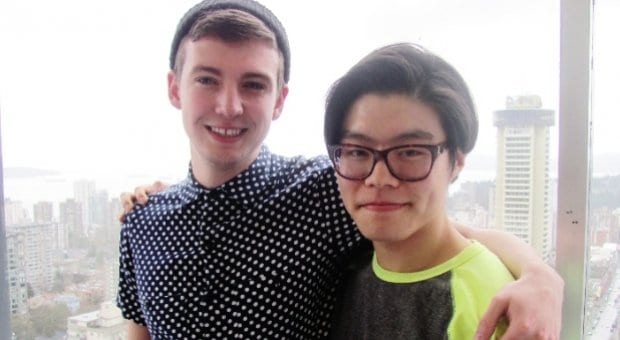Sexual health, relationships, gender and condom negotiation were just a few of the topics raised at this year’s Totally Outright gathering for young gay men, held in Vancouver in March.
Started by the Community Based Research Centre (CBRC) in 2005 and now primarily run by the Health Initiative for Men (HIM), Totally Outright is a four-day leadership workshop for young gay, bisexual, trans and queer guys aged 18 to 26 interested in being healthy, sex-savvy peer leaders in the community.
“Totally Outright was created because at the time there were no young gay men interested in gay men’s health, and now, because of this program, there is way more interest and a lot more people are getting involved,” says Joshun Dulai, past participant-turned-program coordinator.
“A lot of the topics that we cover aren’t really talked about in high schools or anywhere,” he says. “There are not a lot of resources. There’s online, but in person is better. It’s a social atmosphere.”
The program is largely funded by Providence Health and in part by allocations from HIM’s general operations budget, organizers say. Participant intake rests on the program’s annual budget; this year 27 young men were able to attend the program.
Ethan Murley, 20, joined in search of community and resources. “It can be very isolating being a gay man, so it’s a great reminder that we have these spaces and resources for all of us,” he says.
“Personally, I think one of the most important things we discussed is the issue of gender and consent and discussing all of these different topics in relation to consent sexually,” he says.
“I wanted to educate myself more,” says Henry Tai, 20, when asked why he attended the program. “I just wanted to learn more about the gay community and topics such as anti-oppression and consent and gender identity.”
Tai thinks the information he found will apply in his daily life and the friends he made will last a lifetime.
Dulai says he, too, signed up for Totally Outright three years ago as a way to find friends and community support. “It was a time in my life when a lot of my close friends had moved away, and I heard this was a social opportunity to meet other gay guys my age. I joined for social reasons, and I was surprised at how much I learned along the way.”
He says the most popular topic discussed among this year’s participants was inclusion within the gay community.
“We talked a lot about oppression and homophobia and discrimination within the gay community and not just outside of it . . . and a lot of the group projects participants have worked on include building a more inclusive queer community,” he says.
Dulai says the program’s popularity has continued to grow slowly over the years. This year, organizers received 50 applications, five more than last year.
The program isn’t attracting just urban gay men from Vancouver, either. “There are different guys coming from all walks of life,” Dulai says.
Some participants have come from Vancouver Island and the Fraser Valley, and organizers say that including participants from outside the city adds to the program’s diversity and success.
Jody Jollimore, HIM’s senior program manager, has been involved with Totally Outright since 2008, when he was a participant. Today, he presents a two-hour workshop on gay relationships during the gathering.
“We market it as a leadership course to make you a better friend, lover and boyfriend,” he says.
“I spent a lot of time letting the guys talk about being young and gay and in relationships, and for many of them, it’s the first time they get to hang out with other gay guys and talk about those things,” he notes.
The program recently added a component on assertiveness training, where participants can join role-playing scenarios on condom negotiation and setting sexual boundaries.
Another presentation on HIV awareness offers participants an opportunity to meet an HIV-positive person from the community. “For many of the young guys, it’s the first time they’ve had the opportunity to talk to somebody frankly about HIV who actually has HIV,” Jollimore says. “For some, it will be the first time they’ve ever met someone with HIV.”
Jollimore says the crux of the program is the intergenerational mentorship that goes on between community leaders, healthcare professionals and participants.
“We want guys to see that they can be doctors or they can be public-health officials or they can be executive directors of organizations. There are a lot of successful gay men out there, and we want them to know that,” he says.
“I hope [participants] leave the program with a sense of community,” he adds. “That’s really what we’re trying to develop overall. And if they walk away with some safer sex techniques or some safe substance-use techniques or how to be a better boyfriend or lover, then that’s great.”

 Why you can trust Xtra
Why you can trust Xtra


